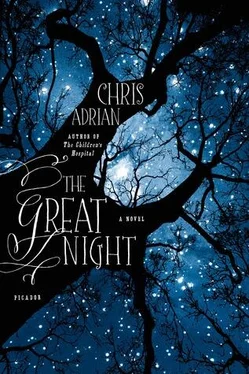“Hey, kid,” it said. “What’s going on?” It was a lady cop, short and wiry and fast, even though she was old, from whom Henry had run a few times before when he’d been stealing in the Castro.
“Nothing,” Henry said, wiping his nose on his sleeve. But he told her everything.
They all said goodbye to him together, just as they had all said hello to him together. Henry was too upset to register all the faces and almost-faces that stared at him, but he caught sight of a few as he was marched down the aisle toward the door out of the hill, faces with whiskers around the eyes or tentacles around the mouth, or noses that looked like they were made of broccoli, or eyebrows that looked like a child had drawn them with crayon. The dog walked next to him, pulling at a chain that was fastened to his silver collar. The lady’s husband had put it on him after he complained about Henry having to go — complained wasn’t actually strong enough a word for what he did. The conversation had started out civilly enough but quickly escalated into a shouting match, everyone in the hall covering their ears and closing their eyes, though nobody ran away or chose not to listen. Henry thought his friend would have won; he was getting bigger and bigger as he shouted louder and louder, and his argument — that a promise to him was being broken — seemed rock solid to Henry, but just when he thought his friend would fall on the lady’s husband and cover him and his objections up forever, the lady produced the chain from under her skirt and clipped it on him. That made him shrink.
“Goodbye,” the lady said to him, on the grass outside the door.
“Goodbye!” said all the rest of the host.
“I want to stay,” Henry said. “Why can’t I stay?”
“You were never here,” the lady said.
“You were never here!” said the host.
“I want to stay!” Henry said, and only realized, when he started crying again, that he had stopped for a little while.
“It’s not allowed,” the lady’s husband said, and Henry’s friend rose up snapping at him, jumping at his throat. But the lady pulled his chain tight, and he fell on his back.
“Down, dog,” she said, and he rolled on his belly, a puppy now, crying fat tears, and Henry thought how dogs cry not just when they’re sad but when they’re angry.
“There is no magic,” the lady said. “There never was. There is only mortal life and mortal cares and death to take them both away. You were never here!” She waved goodbye at him, and everyone else waved goodbye, and the dog howled. They were waving him away, some of them vigorously, some of them halfheartedly; a few, like the lady’s husband, just held up a hand. But the waving hands put a pressure on him; he was going away.
“Something horrible should happen to you!” Henry said, not sure whether he was talking to all of them or just the terrible lady.
“You were never here,” she said again. From very far away he saw her turn her back on him, and all the others followed suit except his friend the black dog, who watched him mournfully over his shoulder as he was dragged along, and then they were gone, and Henry was standing at the entrance to the park, not sure why he was crying.
“ A -one,” said Huff, “and a-two!” A tiny man, dressed in a paper bag and a monocle, was still running to hit his mark. “Don’t make me count to a-three!” Rehearsals were under way, and though time was short (there had already been two false alarms about the Mayor’s return), the players were all industrious, and the addition of the Mayor’s ever more numerous defectors was a piece of edifying good fortune. They did whatever the lovely lady told them to, but Huff wondered whether the grand necessity of the project didn’t also command their loyalty. It had seemed grander by the hour: the additional players made it possible to perform a much more complicated entertainment. Now there were more songs, and more scenes, and more things happening in every scene, and Huff felt like a hundred little tentacles had erupted from his head, each one topped with an eyeball and equipped with a clever little satellite brain, because it felt like he was doing a hundred different things at once, writing dialogue or lyrics or humming out a theme or choreographing a new step, and yet the whole time he was sure as well that he could never take his eyes off the lady.
Princess had her jai-alai baskets back, and the industrious defectors had copied a dozen more pairs and added to them hulking costumes of straw and grass to turn the largest among them into fair semblances of backhoes and bulldozers. Now they danced in blocky mechanical steps and leaps, squaring off in a musical confrontation that the fleshly were destined to lose. It was a sad scene in a sad play, but Huff explained, carefully, when the little man he called Mr. Peanut (because of his size and the brown color of his bag and his monocle) said he was accustomed to singing happy songs and didn’t see why there couldn’t be one or two in this production. Happy songs, Huff said, were not going to move the Mayor to vulnerable, regret-stricken tears.
“You may as well try to wring tears from a stone as from the Beast,” said Mr. Peanut.
“Faith! Faith!” Huff shouted at him. He shouted it a lot, all through rehearsal, because, impossible as their task seemed, he was feeling better and better about it and had confidence in the power of artfully executed musical theater to change a person’s soul. Six hours ago, before he had met his lovely lady friend, before the world (and the musical) had become peopled with strange creatures, little and big, before his crew had been gathered and become outfitted with a new enthusiasm, before things had suddenly started to fall into place, he had been more of a doubter. He hadn’t liked to admit it, but he knew it was possible that they might be arrested or killed or turned into stew before the first transfiguring bar was sung, and that the Mayor might be deaf to their effort and unchanged by it — they might all be wasting their time, just distracting themselves before they became burritos. “But you might say that about anything,” he said to the lady. “You might say that about life in general, that we are all just distracting ourselves before we become burritos.”
“I don’t care for burritos,” she said.
“I don’t like them either, those burritos of futility and despair,” he said. “Though I have eaten them, over and over, down to the last bean and stale tortilla nubbin. But people who believe that it’s all for nothing deserve to have it all turn out for nothing.”
“But it is all for nothing, my love,” she said. “We’ve already lost, and there’s nothing left but this lovely delusion. I am reduced, and you are dead already.”
“Enough of that talk,” he said, and stopped her mouth with a kiss. They retreated behind a bush to make out more discreetly, though not for very long. The clock was ticking the seconds away to the Mayor’s return, and there was barely time to properly rehearse, let alone make out, and yet it was necessary to explore the boundaries of her mouth with his tongue, since they might be in prison or worse when morning came. “Come away, my love,” she said, pulling at his belt and beckoning him behind deeper bushes.
“Duty calls, my lady,” he said, and led her out to the next scene. Short on time but long on players, they were rehearsing multiple scenes at once, five cells scattered around the field waiting for Huff to come inspect them or participate, since he had taken the part of Ty Thorn for himself. So when they had walked a few yards down from where the scoops were dancing aggressively around the food rioters, he joined Princess (who’d put down her baskets and put a rose in her hair) for their pas de deux around a corpse, Hogg in a suit stained with bloody berry juice. “Excuse me, my lovely loon,” he said to his lady, and fancy-stepped over to Princess. They joined hands over the body and released, each of them turning away and kicking a heel up backward just as they brought hand to mouth to bite the knuckle, then they each threw up their hands at the sky and threw back their heads as they stepped lightly on the balls of their feet, circling the body and singing.
Читать дальше












